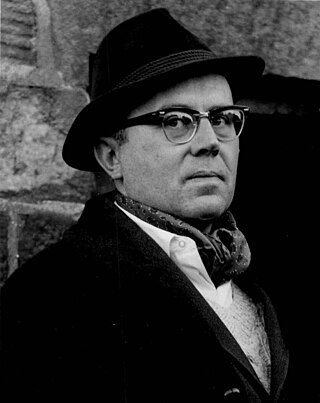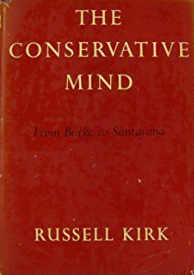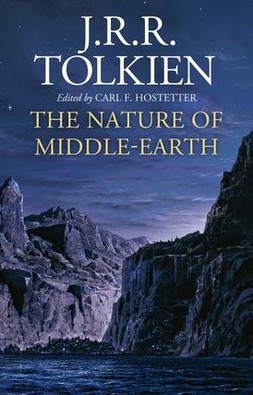Related Research Articles
Denethor II, son of Ecthelion II, is a fictional character in J. R. R. Tolkien's novel The Lord of the Rings. He was the 26th ruling Steward of Gondor, committing suicide in the besieged city of Minas Tirith during the Battle of the Pelennor Fields.
In the fantasy of J. R. R. Tolkien, the Dwarves are a race inhabiting Middle-earth, the central continent of Arda in an imagined mythological past. They are based on the dwarfs of Germanic myths who were small humanoids that lived in mountains, practising mining, metallurgy, blacksmithing and jewellery. Tolkien described them as tough, warlike, and lovers of stone and craftsmanship.

Russell Amos Kirk was an American political philosopher, moralist, historian, social critic, literary critic, and author, known for his influence on 20th-century American conservatism. His 1953 book The Conservative Mind gave shape to the postwar conservative movement in the U.S. It traced the development of conservative thought in the Anglo-American tradition, giving special importance to the ideas of Edmund Burke. Kirk was considered the chief proponent of traditionalist conservatism. He was also an accomplished author of Gothic and ghost story fiction. He is often considered one of the most significant conservative men of letters of the twentieth century.

Joseph Pearce, is an English-born American writer, and as of 2014 Director of the Center for Faith and Culture at Aquinas College in Nashville, Tennessee, before which he held positions at Thomas More College of Liberal Arts in Merrimack, New Hampshire, Ave Maria College in Ypsilanti, Michigan and Ave Maria University in Ave Maria, Florida.

Christopher Henry Dawson was an English Catholic historian, independent scholar, who wrote many books on cultural history and emphasized the necessity for Western culture to be in continuity with Christianity not to stagnate and deteriorate. Dawson has been called "the greatest English-speaking Catholic historian of the twentieth century" and was recognized as being able to expound his thought to "Catholic and Protestant, Christian and non-Christian."

Paul Harold Kocher was an American scholar, writer, and professor of English. He wrote extensively on the works of J. R. R. Tolkien as well as on Elizabethan English drama, philosophy, religion, and medicine. His numerous publications include studies of Christopher Marlowe and Francis Bacon. He also authored books on the Franciscan missions of 18th- and 19th-century California.

J. R. R. Tolkien: Author of the Century is a 2001 book of literary criticism written by Tom Shippey. It is about the work of the philologist and fantasy author J. R. R. Tolkien. In it, Shippey argues for the relevance of Tolkien today and attempts to firmly establish Tolkien's literary merits, based on analysis of The Hobbit, The Lord of the Rings, The Silmarillion, and Tolkien's shorter works.
J. R. R. Tolkien's fantasy books on Middle-earth, especially The Lord of the Rings and The Silmarillion, drew on a wide array of influences including language, Christianity, mythology, archaeology, ancient and modern literature, and personal experience. He was inspired primarily by his profession, philology; his work centred on the study of Old English literature, especially Beowulf, and he acknowledged its importance to his writings.
Númenor, also called Elenna-nórë or Westernesse, is a fictional place in J. R. R. Tolkien's writings. It was the kingdom occupying a large island to the west of Middle-earth, the main setting of Tolkien's writings, and was the greatest civilization of Men. However, after centuries of prosperity many of the inhabitants ceased to worship the One God, Eru Ilúvatar, and rebelled against the Valar, resulting in the destruction of the island and the death of most of its people. Tolkien intended Númenor to allude to the legendary Atlantis.

The Road to Middle-Earth: How J. R. R. Tolkien Created a New Mythology is a scholarly study of the Middle-earth works of J. R. R. Tolkien written by Tom Shippey and first published in 1982. The book discusses Tolkien's philology, and then examines in turn the origins of The Hobbit, The Lord of the Rings, The Silmarillion, and his minor works. An appendix discusses Tolkien's many sources. Two further editions extended and updated the work, including a discussion of Peter Jackson's film version of The Lord of the Rings.

The Silmarillion is a book consisting of a collection of myths and stories in varying styles by the English writer J. R. R. Tolkien. It was edited, partly written, and published posthumously by his son Christopher Tolkien in 1977, assisted by Guy Gavriel Kay, who became a fantasy author. It tells of Eä, a fictional universe that includes the Blessed Realm of Valinor, the ill-fated region of Beleriand, the island of Númenor, and the continent of Middle-earth, where Tolkien's most popular works—The Hobbit and The Lord of the Rings—are set. After the success of The Hobbit, Tolkien's publisher, Stanley Unwin, requested a sequel, and Tolkien offered a draft of the writings that would later become The Silmarillion. Unwin rejected this proposal, calling the draft obscure and "too Celtic", so Tolkien began working on a new story that eventually became The Lord of the Rings.

The Conservative Mind is a book by American conservative philosopher Russell Kirk. It was first published in 1953 as Kirk's doctoral dissertation and has since gone into seven editions, the later ones with the subtitle From Burke to Eliot. It traces the development of conservative thought in the Anglo-American tradition, giving special importance to the ideas of Edmund Burke.

Stratford Caldecott was a Catholic author, editor, publisher, and blogger. His work spanned subjects as diverse as literature, education, theology, apologetics, economics, environmental stewardship, sacred geometry, art, and culture. His books include Secret Fire, Radiance of Being, Beauty for Truth's Sake, All Things Made New, and Not as the World Gives. He was a founding editor of the online journal Humanum and a contributor for several online and print journals. He was inspired by the Catholic author J. R. R. Tolkien and became known as a Tolkien scholar.
Traditionalist conservatism in the United States is a political, social philosophy and variant of conservatism. It has been influenced by thinkers such as John Adams and Russell Kirk.
Christianity is a central theme in J. R. R. Tolkien's fictional works about Middle-earth, but the specifics are always kept hidden. This allows for the books' meaning to be personally interpreted by the reader, instead of the author detailing a strict, set meaning.

Tolkien's artwork was a key element of his creativity from the time when he began to write fiction. A professional philologist, J. R. R. Tolkien prepared a wide variety of materials to support his fiction, including illustrations for his Middle-earth fantasy books, facsimile artefacts, more or less "picturesque" maps, calligraphy, and sketches and paintings from life. Some of his artworks combined several of these elements.
Ralph C. Wood is a scholar of theology and English literature, with a special interest in Christian writers, mainly of fiction, including J. R. R. Tolkien, C. S. Lewis, G. K. Chesterton, Gerard Manley Hopkins, George Herbert, and Dorothy Sayers.

Tolkien and the Great War: The Threshold of Middle-earth is a 2003 biography by John Garth of the philologist and fantasy author J. R. R. Tolkien's early life, focusing on his formative military experiences during the First World War.

The Nature of Middle-earth is a 2021 book of previously unpublished materials on Tolkien's legendarium, compiled and edited by the scholar Carl F. Hostetter. Some essays were previously published in the Elvish linguistics journal Vinyar Tengwar, where Hostetter was a long-time editor.
The Imaginative Conservative (TIC) is an American online conservative journal, founded in 2010.
References
- 1 2 3 "Brad Birzer". Hillsdale College. 2016-03-21. Retrieved July 20, 2018.
- ↑ "J.R.R. Tolkien's Sanctifying Myth: Understanding Middle-Earth". Publishers Weekly . October 28, 2002. Retrieved July 20, 2018.
- ↑ Mitchell, Philip Irving (March 1, 2010). "Book Review: Sanctifying the World: The Augustinian Life and Mind of Christopher Dawson". Christianity & Literature. 59 (2): 369–371. doi:10.1177/014833311005900224.
- ↑ McDaniel, Stefan (August 2010). "American Cicero by Bradley J. Birzer". First Things. Retrieved July 20, 2018.
- ↑ "Bradley J. Birzer". 2015-09-24.
- ↑ Caldwell, Christopher (2016-01-22). "'Russell Kirk: American Conservative,' by Bradley J. Birzer". The New York Times. ISSN 0362-4331 . Retrieved 2022-08-13.
- ↑ Trepanier, Lee (2016). "Book Review | Russell Kirk: American Conservative, by Bradley J. Birzer". The Independent Institute. Retrieved 2022-08-13.
- 1 2 Taylor, Jeff (2019). "Andrew Jackson: Our First Populist President". The American Conservative. 18 (1): 60.
- ↑ Benner, Dave. "In Defense of Andrew Jackson". Abbeville Institute. Retrieved 2022-08-13.
